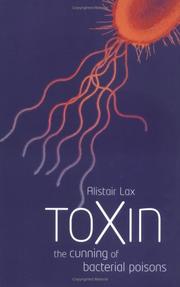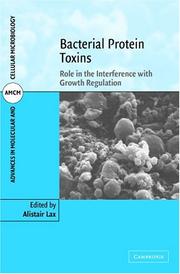| Listing 1 - 2 of 2 |
Sort by
|

ISBN: 1280758147 0191513903 1429421568 9780191513909 9781429421560 9786610758142 661075814X 0198605587 9780198605584 0191578509 1383031223 Year: 2005 Publisher: Oxford ; New York : Oxford University Press,
Abstract | Keywords | Export | Availability | Bookmark
 Loading...
Loading...Choose an application
- Reference Manager
- EndNote
- RefWorks (Direct export to RefWorks)
Alistair Lax reveals the panoply of ways in which bacterial toxins overcome the defences in our cells. He explains how they work, how they are so successful in causing major diseases and how humans can learn to combat them, and even harness them for beneficial purposes.
Bacterial toxins --- Bacterial antigens --- Microbial toxins --- 579.61 --- 615.9 --- bacteriële toxines --- bacteriën --- biologie --- geneeskunde --- microbiologie --- pathologie --- toxicologie --- toxines --- medische microbiologie --- algemene toxicologie --- Bacterial toxins.

ISBN: 9780511546280 9780521820912 9780521177467 0511109687 9780511109683 0511109377 9780511109379 0511121180 9780511121180 0511546289 052182091X 1280162996 9781280162992 052182091X 1107136377 9786610162994 0511197225 0511298595 0521177464 Year: 2005 Publisher: Cambridge, UK ; New York, NY : Cambridge University Press,
Abstract | Keywords | Export | Availability | Bookmark
 Loading...
Loading...Choose an application
- Reference Manager
- EndNote
- RefWorks (Direct export to RefWorks)
Bacterial toxins that act inside cells interact very specifically with key components of the cell and some even manipulate the cell in subtle ways for their own purposes. These potent toxins, described in this 2005 book, will be of interest to both microbiologists and cell biologists. Some of these toxins are conventional multidomain toxins that are self-programmed to enter cells. Others are delivered by type III mechanisms, often as a package of potent molecules. The molecular targets for all these toxins mediate signal transduction and the cell cycle to regulate the crucial processes of cell growth, cell division and differentiation. Thus these potent toxins are not only responsible for disease, but also provide a powerful set of tools with which to interrogate the biology of the cell. In addition such toxins may act directly to promote carcinogenesis and hence their study is also of interest in a wider context.
Bacterial toxins. --- Bacterial antigens --- Microbial toxins
| Listing 1 - 2 of 2 |
Sort by
|

 Search
Search Feedback
Feedback About UniCat
About UniCat  Help
Help News
News